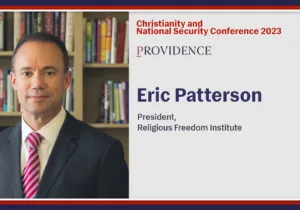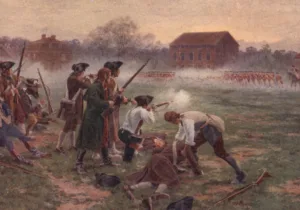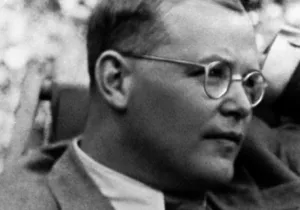The Moral Injury of the Cross
The crucifixion of Jesus Christ on the cross is the greatest expression in all time of the moral injury between God and humanity.
Timothy MallardMarch 29, 2024
The Holy Week Reader—Monday: A Savior Who Overturns Tables
The cleansing of the temple reveals the character of our Messiah and is a model for those who would follow him.
Marc LiVeccheMarch 25, 2024
Rebecca Munson Christianity & National Security 2023
Rebecca Munson’s lecture at Christianity & National Security 2023. Rebecca Munson discusses international human rights, Christian morals, and the fight…
Rebecca MunsonNovember 16, 2023
Eric Patterson Christianity & National Security 2023
Eric Patterson’s lecture at Christianity & National Security 2023.
Eric Patterson discusses the just war tradition, the Augustine nature of Christian realism, and international order. The following is a transcript of the event.
Eric PattersonNovember 16, 2023
Anglicanism vs. Polarization
Anglicanism vs. Polarization will take place over Oct. 20-21.
Ryan N. DankerOctober 17, 2023
How High the Wall between Church and State?
The First Amendment’s Establishment Clause does not mandate a “wall” between church and state, as some progressives believe
Cory HigdonOctober 3, 2023
Moral vs. Immoral Resistance Part IV: The Dismal Ethics of Revolutionary Violence
Revolutionary violence is never ethically justified
Eric PattersonSeptember 1, 2023
Moral vs. Immoral Resistance Part III: The American War for Independence
Part 3 of Eric Patterson’s series on Just War
Eric PattersonAugust 25, 2023
Moral vs. Immoral Resistance Part II: Dietrich Bonhoeffer vs. Colombia’s Terrorists
What is the difference between a terrorist and a freedom-fighter? Part 2 of Eric Patterson’s 4-part series on Just War.
Eric PattersonAugust 18, 2023










 Sponsor a student for Christianity & National Security 2024
Sponsor a student for Christianity & National Security 2024